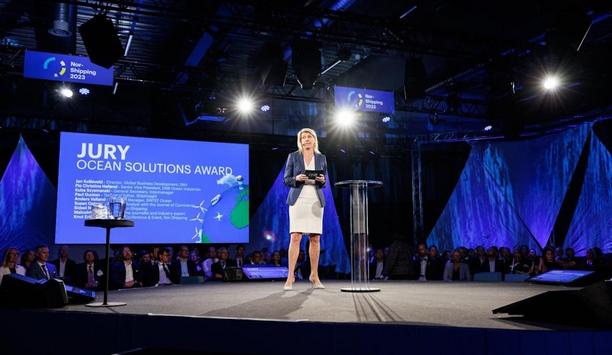Studies on the Mediterranean sperm whale
The International Fund for Animal Welfare (IFAW), OceanCare and WWF Greece are working in collaboration with the Pelagos Cetacean Research Institute, which has been studying the eastern Mediterranean sperm whale population since 1998. These studies have identified the Hellenic Trench, to the west and south of the Peloponnese and southwest of Crete, as critical habitat for these whales.
These deep-diving whales are found here year-round - the only area where family groups have been observed in the eastern Mediterranean, and they concentrate around the 1000m depth contour - directly in the path of busy shipping routes.
Making a positive impact
Responsibility to reflect the longstanding commitment to conserve and protect the ocean and marine wildlife “As a global leader in container shipping and logistics, we have a responsibility to ensure that our cargo operations make a positive impact, reflecting our longstanding commitment to conserving and protecting the ocean and marine wildlife,” said Stefania Lallai, Vice President of Sustainability at MSC Mediterranean Shipping Company.
“Collaborating with NGO partners is key to understanding and taking action to protect endangered sperm whales along the Greek coast.”
Re-routing the shipping route
The area of most concern is currently a major container shipping route, making this re-routing a substantial contribution to the survival of these at-risk whales.
“The whales found dead on the shore with propeller marks and cuts are just the tip of the iceberg. Up to 20 times more die offshore and are never recorded. We are also seeing fewer whales in our yearly research surveys than in previous years, which is a huge concern," explains Dr. Alexandros Frantzis, Scientific Director of the Pelagos Cetacean Research Institute. “It is our fear that without urgent action, deaths through ship strikes will cause this already small population to go extinct very soon."
Making a difference
“By making small re-routing changes, MSC is making a significant difference for these endangered whales. This population is at risk and even one ship strike is one too many. Now we need other shipping companies to show similar leadership – if all ship traffic using this area made these minor adjustments, the ship strike risk to sperm whales would be reduced by almost 75 percent,” comments the NGO coalition.
"Ship re-routing is required now to change the course for sperm whales in the eastern Mediterranean."
Background about the project
Most collisions are fatal but some live animals carry scars from encounters with ship propellers More than half the sperm whales found stranded on the Greek coast show evidence of vessel collisions, known as ‘ship strikes’. This is the highest proportion of deaths caused by ship strikes that is known of for any whale population globally.
Most collisions are fatal but some live animals carry scars from encounters with ship propellers. Evidence from other areas shows that only a very small proportion of ship strikes are detected and reported. In many incidences, mariners on large ships are unaware that they have hit a whale.
Earlier this year, the Greek Ministry of Defense through the Hellenic Hydrographic Office in collaboration with the Ministry of Maritime Affairs and Insular Policy and the Greek shipping industry issued an official notice informing mariners about the presence of marine mammals in the Hellenic Trench. The NAVTEX (NAVigational TEleX) warning instructs mariners to look out for whales and try to avoid collisions with them.
About sperm whales
Sperm whales (Physeter macrocephalus), well known from the legendary tale Moby Dick, belong to the group of toothed whales and can dive to around 2000 metres. Male sperm whales grow to around 16 metres long (some individuals even up to 20 metres) and can weigh up to 41 tonnes.
Due to its small size and geographic isolation, the Mediterranean population is listed as 'Endangered'
Outside of the Mediterranean, sperm whales are listed as ‘Vulnerable’, but due to its small size and geographic isolation, the Mediterranean population is listed as 'Endangered' on the IUCN Red List of Threatened Species.
The NGO coalition working on this issue consists of the International Fund for Animal Welfare (IFAW), OceanCare, the Pelagos Cetacean Research Institute and WWF Greece with the support of the WWF network.
MSC helps protect whales around the world
Among MSC’s activities to protect the ocean environment and life below water include protecting endangered whales, such as right whales (off the US east coast) and blue, humpback and fin whales (off the US west coast) and southern resident killer whales (Canada).
In 2020 - for the third year in a row - we received the highest (Sapphire) Award for ‘Protecting Blue Whales and Blue Skies’ vessel speed reduction incentive programme (joint effort by Santa Barbara County Air Pollution Control District, Ventura County Air Pollution Control District and Bay Area Air Quality Management District partnering with the US NOAA’s Channel Islands, Cordell Bank and Greater Farallones National Marine Sanctuaries, the California Marine Sanctuary Foundation and the Volgenau Foundation).
As in previous years, MSC continues to participate in the annual ‘Haro Strait and Boundary Pass voluntary vessel slowdown’ to reduce underwater noise to support the recovery of endangered southern resident killer whales.











